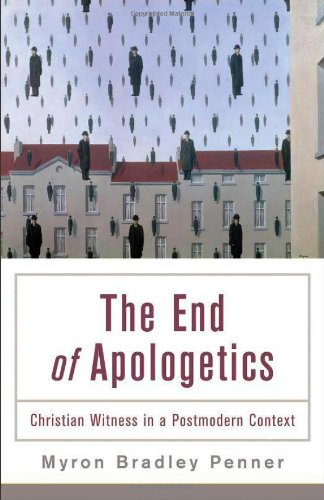Book review: The End of Apologetics
by Myron Bradley Penner
★★★
As we transitioned from a premodern to modern world, as the Enlightenment opened our eyes, and as more and more atheists came out of the closet, Christian apologetics thrived. In this new world, we Christians feel it is our inherent responsibility to prove the truth of our Christian worldview. We feel the need to justify our beliefs. But, when it comes to spreading the Gospel, has apologetics become more hostile than helpful? Does it edify, or does it tear down?
Penner wonders if apologetics is not the single biggest threat to genuine Christian faith. Who do we think we are, trying to bring the Truth (capital T) of God down to our human reasoning level, and strip it down to bite-size truths (little T) that we can nail into our opponents? There’s a difference between knowing something is true and showing it to be true.
Penner feels it’s time to take the next step to postmodernity in our approach to apologetics. The modern Enlightenment worldview is just one way of viewing the world, and may not be the most appropriate way for Christian witness. An apologetic approach that doesn’t respect the identity of our listeners, or that doesn’t highlight the role of Love (for, at it’s most basic level, the Truth of God is about Love), does an injustice to the Gospel. If the Gospel we present isn’t good news, it isn’t true. And truth, says Penner, is something you live, not something you own.
He compares experts to prophets in his discussion of proper, postmodern apologetics. The prophets are preferable; we cling to our experts and trust them to present the facts, but it’s the prophets who deliver a higher truth. Bible prophets cared little about proving the truth of their message. What utter silliness would that be, to question a message from God? Instead, they lived the message.
All of this sounds intuitive and wonderful, yet somehow, the book didn’t inspire a change in me. Too dry, perhaps, or too few real-world examples. I found it intellectual and mildly stimulating, yet ultimately unsatisfying. The philosophical presentation stayed on an intellectual level through the whole book, and never broke through to the heart where it could make a difference.












 354 Circles
354 Circles
 603 Goodreads Friends & Fans
603 Goodreads Friends & Fans

 Hello! I'm an author, historical Jesus scholar, book reviewer, and liberal Christian, which means I appreciate and attempt to exercise the humanitarian teachings of Jesus without getting hung up on any particular supernatural or religious beliefs.
The Bible is a magnificent book that has inspired and spiritually fed generations for thousands of years, and each new century seems to bring a deeper understanding of life’s purpose. This is true of not only Christianity; through the years, our age-old religions are slowly transforming from superstitious rituals into humanitarian philosophies. In short, we are growing up, and I am thrilled to be riding the wave.
I avidly read all thought-provoking religion titles. New authors: I'd love to read and review your book!
Hello! I'm an author, historical Jesus scholar, book reviewer, and liberal Christian, which means I appreciate and attempt to exercise the humanitarian teachings of Jesus without getting hung up on any particular supernatural or religious beliefs.
The Bible is a magnificent book that has inspired and spiritually fed generations for thousands of years, and each new century seems to bring a deeper understanding of life’s purpose. This is true of not only Christianity; through the years, our age-old religions are slowly transforming from superstitious rituals into humanitarian philosophies. In short, we are growing up, and I am thrilled to be riding the wave.
I avidly read all thought-provoking religion titles. New authors: I'd love to read and review your book!
 Hi! While Lee writes the articles and reviews the books, I edit, organize, and maintain the blog. The views expressed here are Lee's but I'm his biggest supporter! :-)
Hi! While Lee writes the articles and reviews the books, I edit, organize, and maintain the blog. The views expressed here are Lee's but I'm his biggest supporter! :-)
Connect With Me!